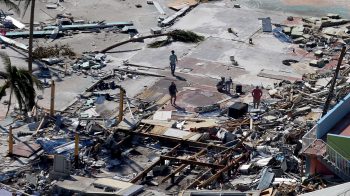Once burned, twice shy?
TEXT OF INTERVIEW
KAI RYSSDAL: Out here in Los Angeles today, there’s a distinct orange haze in the air. You can smell the forest fires that are burning all over Southern California.
President Bush declared seven counties federal disaster areas this morning, which will get government help here all the faster. At last count, as many as 500,000 people have been evacuated. Two men have died, and somewhere nearly 1,500 homes have been destroyed.
The insurance bill will be steep, in the hundreds of millions if not billions of dollars. But chances are, that’s not going to change the way we live, here in California or anywhere else.
We’ve got Martin Grace on the line — he’s a professor of risk management at Georgia State University. Professor Grace, welcome to the program.
Martin Grace: Well, thank you.
RYSSDAL: You know, in the wake of Katrina, we had lots of insurance companies cancelling policies for people and for homeowners who lived nowhere near hurricane zones… Are we now going to see more of the same thing out here?
Grace: The fire risk is a different kind of risk than the wind risk — first of all, a Katrina-like wind risk was kind of unforseen, and the fire risk we’ve had a bit of experience for. And it’s most likely to be part of the general risks that the insurance companies believe they are bearing. This is pretty bad, of course, but it’s probably not something out of the ordinary for what the insurance companies think that they would be covering.
RYSSDAL: Going forward now, as a guy running an insurance company, are you not watching CNN now, saying “Oh, man, we have to do something about this.” Because people are going to keep building out there, rebuilding in northern San Diego County and out in Malibu… It’s not like people are going to stop living out here…
Grace: Well, one of the things they can do — and this is a little different than the hurricane risk issue, but it looks the same — they’re going to say, you know, “While we’re having drought conditions that are conducive to these types of fires, we might either raise our prices or restrict availability in these areas. Insurance is a voluntary business — it’s very difficult to force insurance companies to sell policies… No one’s going to be in business if they can’t make any money.
RYSSDAL: These insurance companies are for-profit businesses, and they have to offer their product to make money to stay in business… If they keep not offering coverage in more and more areas because of events like Katrina or the fires that we’re having out here this week, aren’t they sort of doing violence to their own business model?
Grace: You know, that’s a good question — I think part of it has to do, is that after every time you have a big calamity, it takes two, three, four, five years for the insurers to figure out how to price it and how to think about it. Once the industry figures out how to do it, they will be more willing to it in the future. And as long as the Department of Insurance allows them to price those risks, the companies are still going to be willing to sell those policies. The problem is, people are going to start saying, “Insurance prices are too high — do something about it.” But there is a political cost to be borne by the people who say, you know, “Let’s let the market work.”
RYSSDAL: That’s the question, right — does the market work?
Grace: Oh, it does work. It signals that you’re living in a very risky place, and if you want to stay there, you’re going to have to pay a higher price for that coverage of risk.
RYSSDAL: Do you think in the final analysis, as a guy who does this for a living, that the insurance market is going to change consumer behavior, as it were?
Grace: If the government has the guts to stay out of this in the short run, and not put too many conditions on the insurance industry, the market will evolve to price things properly. So the prices in high-risk areas will go up, development will slow or stop. You know, the idea of free markets giving the people incentives to make decisions that make themselves better off is good for everyone.
RYSSDAL: So it’s politics or the market here?
Grace: Yes. And I think people don’t trust the market.
RYSSDAL: Martin Grace is a professor of risk management at Georgia State University — professor Grace, thanks so much for your time.
Grace: Oh, you’re welcome, and I enjoyed it.
There’s a lot happening in the world. Through it all, Marketplace is here for you.
You rely on Marketplace to break down the world’s events and tell you how it affects you in a fact-based, approachable way. We rely on your financial support to keep making that possible.
Your donation today powers the independent journalism that you rely on. For just $5/month, you can help sustain Marketplace so we can keep reporting on the things that matter to you.


















